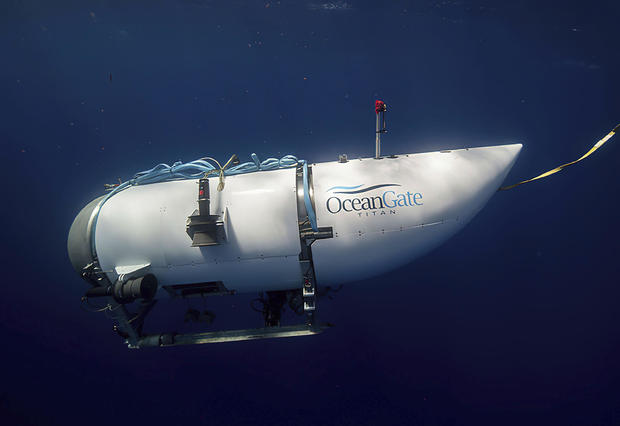Coast Guard recovers "presumed human remains" and debris from Titan sub implosion
The U.S. Coast Guard said Tuesday it had recovered "additional presumed human remains" and what is believed to be the last of the debris from the Titan submersible, which imploded in June in the North Atlantic while on a descent to view the wreckage of the Titanic, killing all five people aboard.
The debris was transported to a U.S. port, where it will be cataloged and analyzed, the Coast Guard said in a news release.
The human remains, which were "carefully recovered from within the debris," have been "transported for analysis by U.S. medical professionals," the agency added.
The salvage operation, a follow-up to a previous recovery mission, was conducted by Coast Guard engineers, National Transportation Safety Board investigators, and the Transportation Safety Board of Canada.
The Coast Guard Marine Board of Investigation has been leading the investigation into what caused the implosion, with help from Canada, France and the United Kingdom.
The Coast Guard said Tuesday its next step will next be to hold a joint evidence review session involving the NTSB and international agencies to analyze the debris, and will follow that up at some point with a public hearing.
MBI investigators have been conducting ongoing evidence analysis and witness interviews, the Coast Guard said.
On June 18, the Titan sub, which was owned and operated by OceanGate Expeditions, lost contact with the Polar Prince, a Canadian research vessel, about one hour and 45 minutes into its voyage to the wreckage of the Titanic.
Prior to discovering that the sub had imploded, a massive international search and rescue effort ensued over the course of several days because of the limited amount of oxygen that would be aboard the sub if it had become trapped beneath the surface.
However, on June 22, the Coast Guard announced that the sub had experienced a "catastrophic loss of the pressure chamber" during its decent four days prior, confirming that the Titan's debris had been located about 900 nautical miles east of Cape Cod, Massachusetts.
Those who died in the implosion were OceanGate CEO Stockton Rush, Pakistani businessman Shahzada Dawood, his 19-year-old son Suleman, billionaire adventurer Hamish Harding and French explorer Paul-Henri Nargeolet.
OceanGate suspended all operations in early July. The company, which charged $250,000 per person for a voyage aboard the Titan, had been warned of potential safety problems for years.
A professional trade group in 2018 warned that OceanGate's experimental approach to the design of the Titan could lead to potentially "catastrophic" outcomes, according to a letter from the group obtained by CBS News.
In announcing its investigation, the Coast Guard said it would be looking into possible "misconduct, incompetence, negligence, unskillfulness or willful violation of law."
— Aliza Chasan, Aimee Picchi and Alex Sundby contributed to this report.




